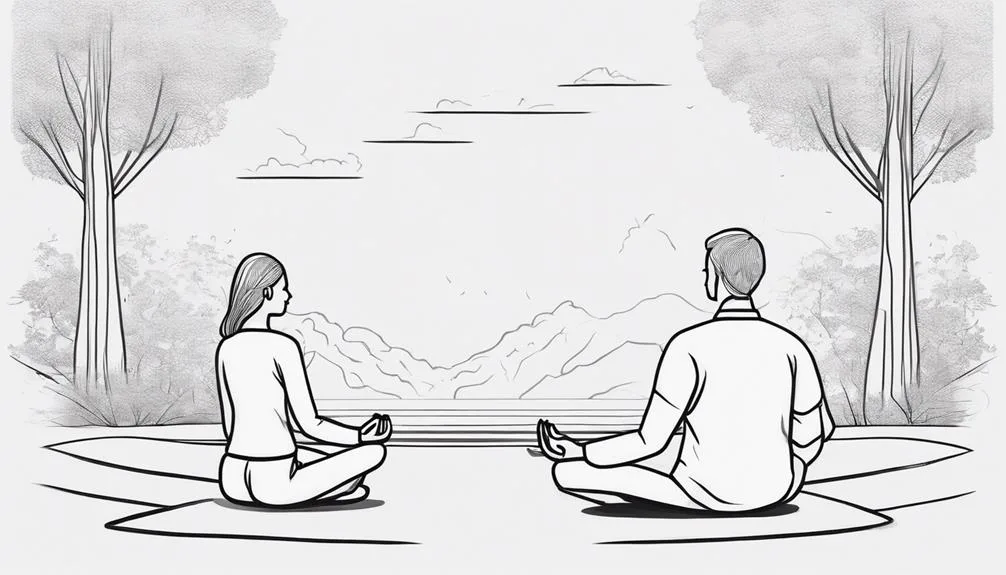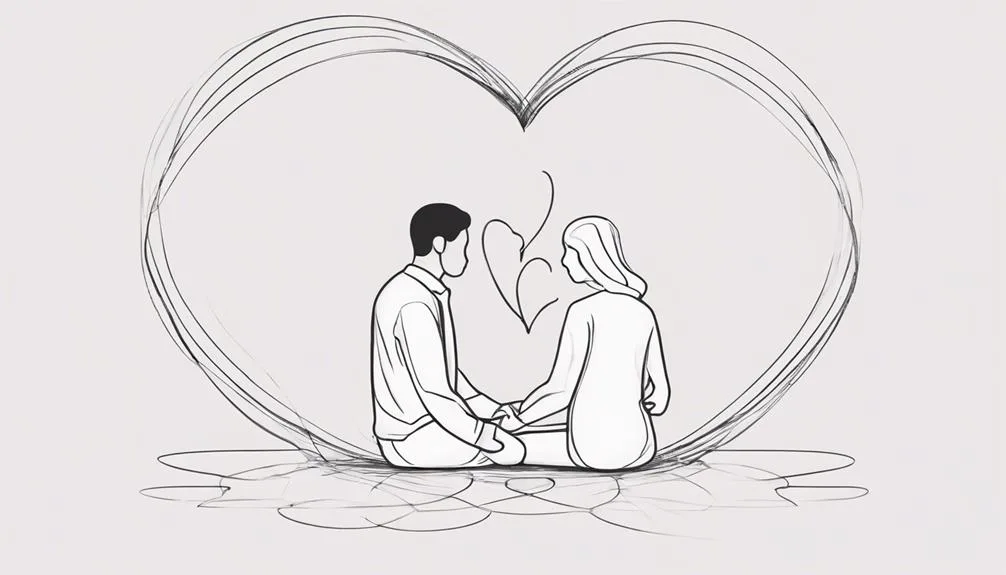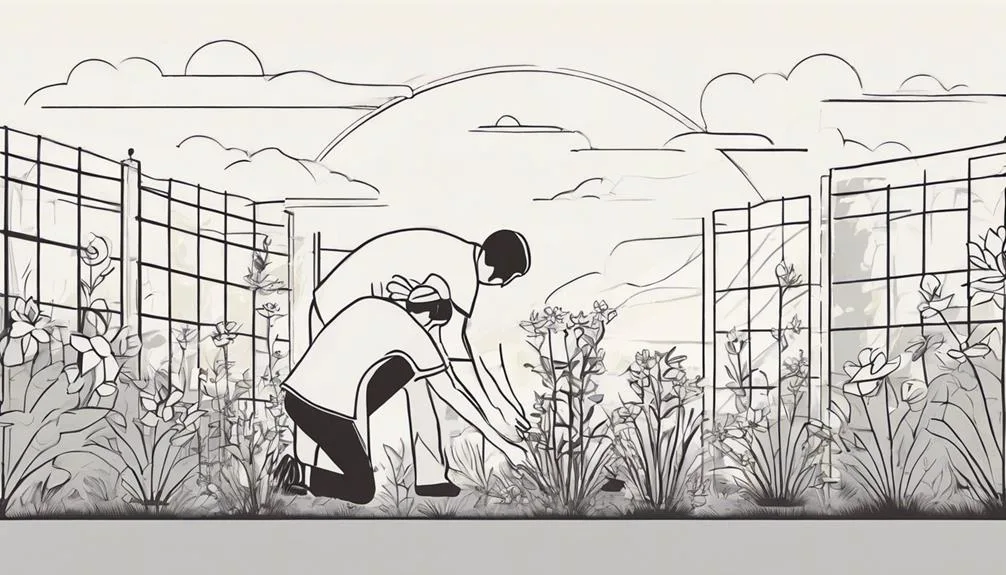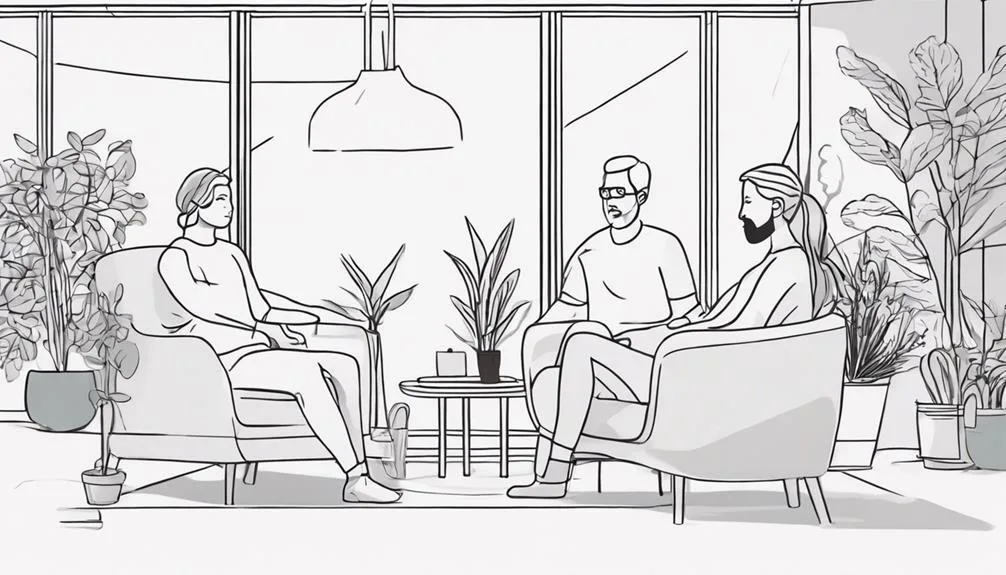Overthinking in relationships can be a big problem, but you're not alone if you're experiencing it. Learning to recognize what triggers your overthinking and practicing being present can help you start to overcome it.
Talking openly with your partner, setting time to discuss concerns, focusing on things you can control, and getting professional help if needed are good ways to deal with it.
Let's look at how these steps can help improve your relationship.
Key Takeaways
- Identify triggers and develop coping strategies to manage overthinking.
- Practice mindfulness to detach from overthinking and focus on the present.
- Communicate openly and build trust to strengthen your relationship.
- Allocate specific worry time and use journaling to organize thoughts.
Recognize Your Triggers

Identifying your triggers is the first step to stop overthinking in your relationship. It's important to understand what sets off your spiral of thoughts. Is it a lack of communication, or perhaps, social media interactions? Once you pinpoint these triggers, you're better equipped to manage your reactions.
Anxiety management techniques can be a game-changer here. They help you calm your mind and reduce the intensity of your overthinking. Additionally, thought journaling is an effective tool. By writing down your thoughts, you're able to see patterns and address the root causes of your anxiety.
This process not only helps in recognizing your triggers but also in developing strategies to cope with them, making your relationship healthier and more fulfilling.
Practice Mindfulness Regularly

After recognizing your triggers, it's also important to incorporate mindfulness into your daily routine to further combat overthinking in your relationship. Mindfulness, especially mindful breathing, roots you in the present moment, preventing your mind from wandering into the domain of 'what-ifs.'
| Technique | Benefit |
|---|---|
| Mindful Breathing | Calms the mind, focuses on the present |
| Body Scan | Reduces physical tension |
| Walking Meditation | Connects body and mind |
| Observing Thoughts | Allows detachment from overthinking |
| Gratitude Journal | Shifts focus to positive aspects |
Communicate Openly With Your Partner

Open communication with your partner is a cornerstone to overcoming overthinking in your relationship. When you're feeling swamped by your thoughts, it's essential to talk things out rather than letting your fears and doubts fester.
Addressing trust issues head-on, for instance, can prevent them from ballooning into bigger problems. It's about being honest, even when it makes you feel emotionally vulnerable. This vulnerability, though, is what strengthens your bond.
By sharing your worries, you're not only unburdening yourself but also showing your partner that you trust them enough to see your less polished side. Remember, it's okay to ask for reassurance when you need it. In turn, listen actively when they express their own concerns.
This mutual openness lays the groundwork for a healthier, overthinking-free relationship.
Set Aside Worry Time

Allocating specific periods of the day to process your worries can greatly reduce overthinking in your relationship. This designated worry time allows you to compartmentalize your concerns, freeing up mental space for more positive interactions with your partner. Consider using this time for journaling, a proven effective method for sorting through your thoughts and feelings. The benefits of journaling are vast; it helps you clarify your worries, recognize patterns in your thinking, and find solutions more easily.
Incorporating exercise routines into your worry time can also be beneficial. Physical activity releases endorphins, natural mood lifters, which can alleviate stress and anxiety. By focusing on your physical wellbeing, you're less likely to dwell on negative thoughts, making it easier to maintain a balanced perspective in your relationship.
Focus on What You Can Control

Focusing on aspects within your control can greatly reduce relationship-related overthinking. It's easy to get caught up in the 'what ifs' and potential outcomes that you have no power over. Instead, direct your energy towards your actions and responses.
Embrace uncertainty as a part of life and relationships; it's not something to shy away from but to accept as inevitable. Limit comparisons to others' relationships or to idealized standards. These comparisons only fuel overthinking and dissatisfaction.
Concentrate on improving your communication, showing appreciation for your partner, and being present in the moment. By channeling your thoughts into actionable steps and positive behaviors, you'll find less room for overthinking and more space for growth and happiness in your relationship.
Seek Professional Help if Needed

While it's beneficial to concentrate on what you can control, there are times when you might need to seek professional help to manage overthinking in your relationship. Therapy benefits you by providing tools and strategies to tackle overthinking head-on. Support groups offer a sense of community and understanding, showing you're not alone in your struggles. Don't hesitate to reach out for help if you find your thoughts spiraling out of control.
| Therapy Benefits | Support Groups |
|---|---|
| Tailored coping strategies | Community and belonging |
| Professional insights | Shared experiences |
| Emotional support | Encouragement from peers |
| Objective perspective | Access to resources |
| Safe space for expression | Collective wisdom and advice |
Conclusion
Armed with these strategies, tackling overthinking becomes a journey towards a healthier relationship. Embrace mindfulness, open communication, and a focused approach to worries, recognizing your control over them. These steps aren't just solutions but pathways to deepen your connection with your partner.
Should the burden feel too heavy, remember, reaching out for help is a strength. Reflecting on these actions, one might wonder, how much richer can our relationships become when we clear the fog of overthought? This approach doesn't just manage a problem; it invites a stronger, more intimate bond.

